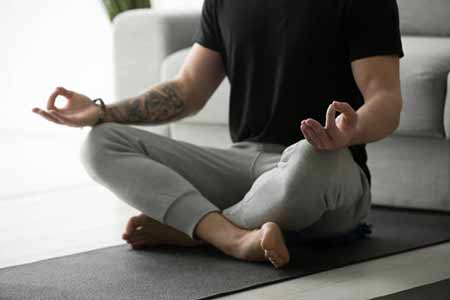Before starting a meditation program, there are a few tips to keep in mind. It can be boring to meditate for the first few times, so it is helpful to focus on certain sensations that you can control like breathing. Try not to push yourself too hard or you may find that you experience restlessness. Just keep these tips in mind, and your meditation program will soon be a breeze. This article is intended for the complete beginner and will help you get started.
Self-guided meditation app

Headspace is a popular self-guided meditation app. This app features 45 guided meditation sessions spanning several different lengths. Its main voice is Andy Puddicombe, and it helps you master various meditation techniques. It offers a variety of options, such as choosing between a male or female voice and a wide variety of breathing techniques. Headspace offers several free versions of its program. You can download it to your smartphone or tablet to use it offline.
Preparing for meditation
The duration of a meditation session depends on personal preference and time availability, but in the beginning, frequency is key. Beginners may want to begin with 10-minute sessions and gradually increase the duration to 15 or 20 minutes as they become comfortable. Beginners may also benefit from guided meditations, which typically last three to five minutes. As time goes on and they build confidence, they may wish to practice more time-intensive techniques. Depending on the goals of the program, meditation techniques may range from short, daily, to long-term meditative sessions.
Counting your breaths
Counting your breaths is a great way to focus on your breathing. You can start by focusing on your torso, chest, and abdomen areas. Next, count your breaths, beginning with one. Count each breath as it enters your lungs, and exhale fully. Repeat this for five to ten cycles, beginning with one and going up. Counting your breaths is an excellent way to practice mindfulness and to develop a meditation program that will help you focus on your breathing, continue to URL.
Choosing a focal point
During meditation, choosing a focal point will help you focus your attention on the present moment. While a mantra can be effective, it is not appropriate for everyone. You can also focus on sensations such as your breath or sound. Whatever you choose, make sure that you have a focus point that is comfortable for you. This will help you maintain focus on your meditation program, even if your mind wanders during the meditation.
Mindful self-compassion course
A mindfulness-based meditation program, the Mindful Self-Compassion (MSC) program is a proven eight-week training program for cultivating the skill of self-compassion. The program is based on groundbreaking psychological research by Drs. Kristin Neff and Christopher Germer. It teaches the principles and practices of mindfulness-based self-compassion to help participants overcome their anxiety, depression, and perfectionism.
Avoiding negative emotions while practicing meditation
The practice of meditation brings clarity to the mind. As a practitioner, you sit and notice your breath, observing your thoughts, feelings, and patterns in real time. This awareness allows you to see the true nature of your emotions, rather than just the feeling. By learning to become mindful of these feelings, you will experience a sense of spaciousness and peace. You will begin to notice how you react to the world around you, and how you react to different situations.